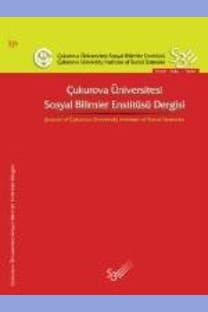İş Akış Deneyiminin Kişilik Özellikleri Ve İş Stresi İle İlişkisi: Akademik Personel Üzerine Bir Araştırma
Öz
Bu çalışma son on yıldır oldukça popüler olan iş akış deneyimi ile bireysel değişkenler arasındaki ilişkiyi incelemeyi amaçlamaktadır. İncelenen bireysel değerler kişilik özellikleri ve strestir. Bu doğrultuda Ege, Akdeniz ve İç Anadolu bölgelerinden 110 akademik personelden anket yöntemiyle veri toplanmıştır. Analizlerin ardından, sorumluluk kişilik özelliğinin tüm iş akışı boyutları ile pozitif yönlü anlamlı ilişkiye sahip olduğu bulunmuştur. Ayrıca, işten zevk alma ve içsel motivasyon boyutları ile iş stresi değişkeni negatif yönlü ilişkiye sahiptir.
Anahtar Kelimeler:
İş akış deneyimi, optimal performans duygu durumu, kişilik özellikleri, iş stresi, akademisyen
___
- Asakawa, K. (2004), Flow experience and autotelic personality in Japanese college students: How do they experience challenges in everyday life?, Journal of Happiness Studies, (5): 123-154. Asakawa, K. (2010), Flow experience, culture, and well-being: How do autotelic Japanese college students feel, behave, and think in their daily lives?, Journal of Happiness Studies, (11): 205-223. Bakker, A. (2007), The Work-Related Flow Inventory: Construction and Initial Validation of the WOLF, Journal of Vocational Behavior, (72): 400-414. Bassi, M., ve Delle Fave, A. (2004), Adolescence and the changing context of optimal experience in time: Italy 1986-2000, Journal of Happiness Studies, (5): 155-179. Baumann, N. (2012). Autotelic Personality. Engeser S. (Ed.), İçinde Advances in Flow Research, Springer ScienceBusiness Media:. 155-186. Burke, R.J. (2010), Flow, Work Satisfaction and Psychological Well-Being at the Work Place, The IUP Journal of Soft Skills, 4(1): 37-48. Bye, D., Pushkar, D., & Conway, M. (2007). Motivation, interest,and positive affect in traditional and nontraditional undergraduate students. Adult Education Quarterly, (57): 141-158. Csikszentmihalyi, M. (1975), Beyond boredom and anxiety, Jossey-Bass Publishers, San Francisco. Csikszentmihalyi, M. (1990), Flow: The Psychology of Optimal Experience, Harper Collins Modern Classics, NewYork. Csiskzentmihalyi,M. (2003), Good Business, Viking, NewYork. Csikszentmihalyi, M., ve Csikszentmihalyi, I. (1992), Optimal experience: Psychological studies of flow in consciousness, Cambridge Univ Press. New York Csikszentmihalyi,M., ve LeFevre, J. (1989), Optimal experience inwork and leisure, Journal of Personality and Social Psychology, 56(5):815-822. Csikszentmihalyi, M., (2005), Akış Mutluluk Bilimi, çev. Sema Kunt Akbaş, HYB yayıncılık, Ankara. Fong, C. J., Zaleski, D. J., ve Leach, J. K. (2014). The challenge-skill balance and antecedents of flow: A meta-analytic investigation. The Journal of Positive Psychology: 1-22. Gosling SD, Rentfrow PJ, Swann WB Jr. (2003), A very brief measure of the Big Five personality domains. J Res in Pers, (37):504-528 Hager, P.L., (2015), Flow and Five Factor Model (FFM) of Personality Characteristics, Dissertataion, Unıversity of Missouri, Kansas City. House, R.J. ve Rizzo, J.R. (1972), Role Conflict and Ambiguity as Critical Variables in Model of Organizational Behavior, Organizational Behavior and Human Performance, (7): 467-505. Lazarus, R. S., Kanner, A. D., ve Folkman, S. (1980), Emotions: A cognitive-phenomenological analysis. R. Plutchnik, ve H. Kellerman (der.), Theories of emotion. Emotion. Theory, research, and experience İçinde, New York: Academic, (1): 189-217. Moneta, G. (2004), The flow model of intrinsic motivation in Chinese: Cultural and personal moderators, Journal of Happiness Studies, (5): 181-217. Nakamura, J. ve Csikszentmihalyi, M. (2005), The Concept of Flow. , C.R. ve Lopez, S.J. (der), Handbook of Positive Psychology, Snyder Oxford: Oxford University Press: 89-105. Peifer, C., Schulz, A., Schächinger, H., Baumann, N. ve Antoni, C.H. (2014). The relation of flow-experience and physiological arousal under stress- Can u shape it?. Journal of Experimental Social Psychology (53): 62-69. Prescott, S., Csikszentmihalyi, M., ve Graef, R. (1981). Environmental effects on cognitive and affective states: The experiential time sampling approach. Social Behavior and Personality, (9): 23-32. Ross, S. R., ve Keiser, H. N. (2014), Autotelic personality through a five-factor lens:Individual differences in flow-propensity. Personality and Individual Differences, (59): 3-8. Ullen, F., Manzano, O., Almeida, R., Magnusson, P. K. E., Pedersen, N. L., Nakamura, J., Csikszentmihalyi, M., ve Madison, G. (2012), Proneness for psychological flow in everyday life: Associations with personality and intelligence, Personality and Individual Differences, (52): 167-172. Weimar, D. (2005). Stress und Flow-Erleben. Eine empirische Untersuchung zur Bedeutung von Kognitionen, Emotionen und Motivation bei Lehramtsstudierenden, Referendaren und Lehrern [Stress and flow-experience. An empirical investigation of the meaning of cognitions, emotions and motivation in teachers and teachers-in-training]. Berlin: Logos.
- ISSN: 1304-8880
- Yayın Aralığı: Yılda 2 Sayı
- Başlangıç: 2013
- Yayıncı: Çukurova Üniversitesi Sosyal Bilimler Enstitüsü Dergisi
Sayıdaki Diğer Makaleler
GSYH'NİN ÖTESİ: EKONOMİK GELİŞMENİN ÖLÇÜMÜNDE ALTERNATİF METRİKLER
Ceyda Erden Özsoy, B. Tuğberk Tosunoğlu
TÜRKISCHE UND DEUTSCHE WERBUNG FÜR PARFÜM UND KOSMETIK
Tahir BALCI, Halime BALCI, H. Hale ARISOY
Bülent Cercis Tanrıtnır, A. Melike Çalışkan
ÂŞIK ŞİİRİNDE BAŞKALDIRI BAĞLAMINDA NESİMİ ÇİMEN
Tuncay Turan Turaboğlu, Tuğba Nur Topaloğlu
Sosyal Güvenlik Ve Yeniden Gelir Dağılımına Etkisinin Teorik Çerçevede Değerlendirilmesi
